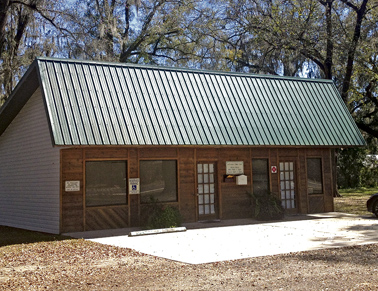DAVID S. WISENER/Alachua County Today
The Town of LaCrosse hownhall sits nestled beneath a canopy of oaks in the rural community of fewer than 400 people.
LACROSSE – LaCrosse is the quintessential small, rural southern town.
With a population of less than 400, it's the smallest incorporated community in Alachua County.
“People like the small town element that provides some privacy, and I think that's the draw for most people to LaCrosse,” said Mayor Diane Dubberly.
Situated a few miles northeast of the city of Alachua and the first county settlement of Newnansville, the LaCrosse area was first settled not long after the end of the Second Seminole War in 1842.
The John Cellon and Richard Parker families are credited as the most influential pioneers of LaCrosse, and both families maintain a presence in the community to this day.
The grandfather of Parker's wife, Hannah Flowers, was among the earliest American settlers in Alachua County, having moved into the area in 1813 while Florida was still a Spanish possession.
While LaCrosse didn't have a post office until 1881, the community existed for at least 30 years prior. Farming has always been the principle industry, with the primary crop shifting from cotton to potatoes after the boll weevil devastated Southern cotton crops through the early 20th Century.
There is no definitive answer for how LaCrosse received its name, but the most likely origin may hint at the influence of the political ramifications from a little-studied nearby community.
According to John Pickard's book “Florida's Eden: An Illustrated History of Alachua County,” the town of Gordon was established within a handful of miles of LaCrosse by seven ex-Union officers soon after the end of the Civil War.
Garth “Wilky” James was the leading figure in Gordon who began the community as a cotton plantation of over 3,000 acres with the intent of creating an integrated society, hiring 30 black workers to work alongside 40 white workers and building a school for fifty white and black children.
Pickard writes that James “served as the Gordon postmaster and enthusiastically entered into local politics.” Within the short span of five years, however, three consecutive failed cotton harvests, two failed political campaigns, bouts of malaria, and noted strife from nearby residents caused James to leave Florida in 1871.
Coincidentally or not, the name of “LaCrosse” was used 10 years later, attributed alternatively to Richard Parker's influential son, H.C. Parker, and the wife of cotton merchant John Eli Futch.
An article from the "Gainesville Daily Sun" in 1914 notes that the community called LaCrosse was originally known as Hickory Head and DeSoto before H.C. Parker made the change in honor of a short-lived but popular political newspaper based out of La Crosse, Wisconsin, the “La Crosse Daily Democrat.”
The background behind Mrs. Futch's naming also notes that she recommended “LaCrosse” because “I've always loved the name of La Crosse, ever since I read about La Crosse, Wisconsin,” according to “Places in the Sun: The History and Romance of Florida Place-Names” by Bertha E. Bloodworth and Alton C. Morris.
The “Daily Democrat” had been heavily critical of all things Republican, an obviously attractive opinion in the post-war, Reconstruction Era South.
H.C. Parker became LaCrosse's largest benefactor, contributing the land on which the community rests, operating a large mercantile store and farm, and supporting the construction of a school house and church.
The peak of prosperity came at the turn of the 20th Century, when LaCrosse boasted several stores, a hotel, and two cotton gins.
Mayor Dubberly said maintaining the consistent small-town atmosphere is important to most of LaCrosse's residents.
“We don't have a real impetus to be a bigger city,” she said. “We have more geographical area than population. We look somewhat similar to the way we did when I moved here in 1980.”
Dubberly said the transportation improvements currently underway along State Road 121 will hopefully contribute to the presence of a few more businesses in the near future, though.
“We would like to see a few more on-street businesses,” she said. “We're on one of the main routes from Gainesville through Union County and on into Georgia. But our residents would like us to stay about this size. We're just a rural small town with those kinds of values."
# # #
Email Dwisener@
alachuatoday.com
Town of LaCrosse profile
Tools
Typography
- Font Size
- Default
- Reading Mode


